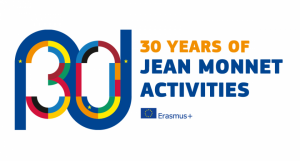 Module on “Migration policy challenges in the EU and the South Caucasus” (MiPEC) is designed to address legal, political, cultural and social aspects of migration in the region and the European Union. It is compulsory part of the MA in European Studies curriculum and it is additionally offered as optional course for international relations, law and sociology students. A module on migration is taught for the first time in the frames of the MA in European Studies.
Module on “Migration policy challenges in the EU and the South Caucasus” (MiPEC) is designed to address legal, political, cultural and social aspects of migration in the region and the European Union. It is compulsory part of the MA in European Studies curriculum and it is additionally offered as optional course for international relations, law and sociology students. A module on migration is taught for the first time in the frames of the MA in European Studies.
MiPEC is multidisciplinary in its structure and approach. In terms of teaching, it is divided into three parts where each is designed or modified to meet general objective of the module and the curriculum, syllabus structure, identification of learning outcomes, etc. The courses are taught by four professors from different departments (law, political science, linguistics, Centre for European Studies) of the Yerevan State University. The Module consists of the following courses:
Course 1. Multiculturalism, identity and values (course was modified on the bases of “Introduction to European integration. Cultural perspective”/ team teaching)
Course 2. Legal regulation of the migration processes and asylum issues in the EU and the RA (new course)
Course 3. Labour migration policy: EU and the South Caucasus (new course)
The module will be based on student-centred education that implies application of various teaching/learning activities (lectures, seminars, webinars, group and individual works, cases studies and simulations), etc.
Other Activities:
-
-
- Meeting and discussion with UNHCR Armenia (Guest lecture & Discussion)
- Round Table Discussion with Head of Migration Service in Armenia
- Elaboration of textbooks and dissemination materials
- Participation in elaboration of new textbook on European Studies (AESC initiative)
- Dissemination of Project results during Erasmus+ Info Days in Armenia
- Cooperation with Jean Monnet Chairs and Professors
-
Academic Staff
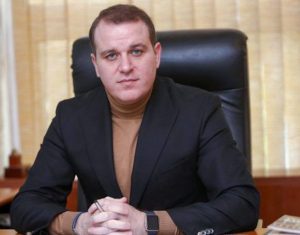
Dr Vladimir Martirosyan, Academic Coordinator of the Jean Monnet Module, is an Associate Professor in Political Science at the Yerevan State University. He is also Deputy Director of the Centre for European Studies since 2008. Dr Martirosyan received Master’s Degree in Political Science in 2002 and defended PhD in Political Science in 2005.
Currently Dr Martirosyan is member of a team elaborating interdisciplinary textbook on European Studies that is implemented by various departments of the Yerevan State University.
Dr Martirosyan’s research interests lie in the areas of European Studies and European integration, decmocracy and democratisation, Western Democracies and political regimes.
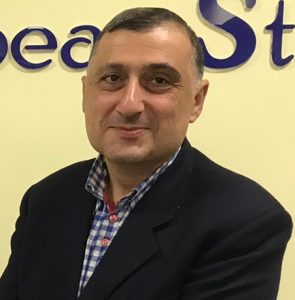
Ashot Aleksanyan is a Doctor of Sciences (Political Sciences), a lecturer and expert at the Centre for European Studies, an Associate Professor at the Chair of Theory and History of Political Science of Yerevan State University. He is a Managing editor of the Bulletin of Yerevan University: International Relations, Political Science.
His research and teaching focus on European integration, civil society, democratization in the former Soviet space and Russia, social partnership, human political rights and freedoms.
He was a visiting scientist at the Institute of Political Science of Leibniz University of Hannover, Geschwister Scholl Institute of Political Science of Ludwig-Maximilian University of Munich and the Institute for East European Studies of Free University of Berlin organized with DAAD project. In addition, he was a visiting scientist at the Faculty of Social Sciences of the Katholieke Universiteit Leuven in Belgium and at the Institute of Political Science of the Friedrich-Schiller-University Jena, organized within the EU Erasmus Mundus project. His work has been published in Bulletin of Yerevan University: International Relations, Political Science, Journal of the “Universe of Russia” (Mir Rossii), EUCAC IS Online Paper etc.
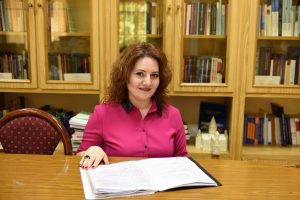
Knarik Vardanyan, lecturer of the Jean Monnet Module, is an Associate professor in Law at the Yerevan State University. She is the Director of Legal clinic and lecturer at the Chair of European and International law, YSU. Her research and teaching focuses on International human rights, Asylum law and migration, International and European legal regulation of migration issues, International and national protection of refugees, Law of International organizations. She is the Member of Bar Association of the Republic of Armenia. Her works have been published in the main Armenian periodical law journals
In cooperation with UNHCR and Mission Armenia NGO she published handbook on Refugee law which allows students to attain thorough understanding of the 1951 Convention relating to the Status of Refugees, its 1967 Protocol as well as the EU regulation of migration and asylum issues and the other regional instruments. Also as an expert of the RA Ministry of Diaspora she has done a research on International legal acts related to refugees and asylum-seekers and their national legal implementation in the Republic of Armenia discussing the issues related to refugees and asylum-seekers, a study and analysis related to implementation of international legal acts, in particular.
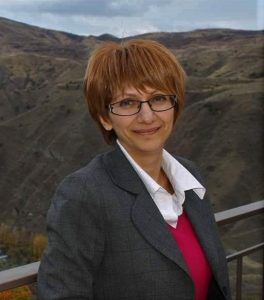
Ms Kristine Gevorgyan, member of the teaching staff, holds Bachelor’s and Master’s Degrees in English Philology from Yerevan State University; she also holds Master’s Degree in Euroculture, Uppsala University Sweden. Ms Gevorgyan in Programme Coordinator at the Centre for European Studies. She is also team member of Erasmus+ Higher Education Reform Experts Armenia.
Her research and teaching interests focus on multiculturalism, European integration, migration, multilingualism, linguistic rights of national minorities, cognitive linguistics. She has been involved in implementation of Jean Monnet Module /2010-2013/, DESCnet Jean Monnet Network. She is one of experts on Jean Monnet Actions and has been presenting the action during ERASMUS+ Info Days.

This project has received funding from the European Union’s Erasmus+ Jean Monnet programme under Grant Agreement 575623-EPP-1-2016-1-AM-EPPJMO-MODULE
